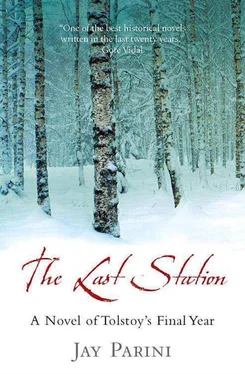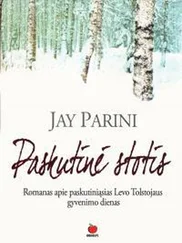‘It’s fascinating to try to guess what our grandchildren will read,’ he said later, as we drank a scented Indian tea in the blue parlor with Bulgakov and Tanya. ‘In my time there was a definite range of classic books, and one knew exactly what it meant to be an educated man. Now there are so many books, one is naturally confounded.’
I said that, surely, the one author whom everyone would read in the future was Leo Tolstoy, but he merely shook his head and grinned.
On the sixth day of May, a telegram arrived from Chertkov, saying that he had received permission to visit Kochety. Leo Nikolayevich was overjoyed, though he was able to resist gloating. It is tedious when someone – even Leo Tolstoy – cannot restrain his happiness.
Chertkov arrived midmorning, while Leo Nikolayevich was working in his room. One is normally careful not to disturb him when he’s working, but I felt no hesitation that day. He looked up with childlike gratitude, then rushed down the stairs to greet this man whom he refers to as ‘a dear person and precious friend.’
They met on the front steps, kissing affectionately on either cheek. Vladimir Grigorevich paid the driver, while Leo Nikolayevich went inside the front hall and blew his nose. I saw that his face was damp with tears. He appeared quite shaken by the experience, and I felt sorry for him. He is a man of such overwhelming emotions. I understand this, though I rarely experience anything like it myself.
The two friends went up to the bedroom where Vladimir Grigorevich was staying, and they remained there until the bell was rung for lunch.
But, alas, Leo Nikolayevich’s euphoria was short-lived. I heard the wheels of a coach outside, dogs barking at the hubs, much shouting and clamor of servants. Out stepped Sofya Andreyevna and her son, the dutiful and boring Andrey. That woman has an instinct for knowing when her husband is about to enjoy himself.
I thought of England this morning. The early light, soft and gray, had a wet, acidic tang. I stood at the window in my nightdress, watching through the mist, when a bright yellow oriole flashed into sight. Today I would see Leo Nikolayevich. And God had sent this oriole as a harbinger of joy.
I sat down on the bed, trembling. The years in England did much to gird my soul. I read and thought deeply. I made endless speeches on behalf of Leo Nikolayevich. I was greeted warmly everywhere from Southampton to Birmingham and Newcastle. Once, I even traveled into Scotland to address a group of Glaswegian shipbuilders who had a Tolstoy ‘study group.’ Most impressive. One cannot imagine that sort of thing happening in Russia. The only thing I disliked about England, apart from the essentially frivolous nature of the English mind, was the forced separation from my Master.
People are mistaken when they say I love the man. What I love is the Tolstoyan firmness, the call to truth and justice. The lineaments of his prose entangle, embody, render visible the elusive matter of these virtues.
We met at a time when my soul was just awakening. I looked on my life of luxury and privilege with contempt, seeing that I had contributed to the injustice of the world. I had added to its misery by remaining ignorant of what is cruel and unjust.
It was my assignment to a military hospital that alerted me to the truth. I found the hospital crammed, not only with the sick but with political prisoners of various stripes: pacifists, mystics, revolutionaries, Christians who refused to accept the violence of the state, brave men who did not find the tsar’s barbarous policies acceptable and dared to say so.
I resigned from the regiment and went to live by myself on an estate in Voronezh owned by my mother. It was a modest country house, with an adjoining farm. I felt marvelously solitary there, but I could not recover my former balance. The world seemed thin as rice paper, so fragile that at any moment ‘reality’ – which now looked like a tragic illusion – might break.
Bleakness overwhelmed me. I wakened each night with sweat beading my face, my breath shallow. I could feel my pulse throbbing in distant parts of my body, sounding in the void of the universe like deadly drumming. I was suffocating, but I clung to life as a drowning man clings to a piece of driftwood.
Both life and death seemed intolerable, terrifying. I shook like an old man, kneeling by my bed there, praying to a God whom I did not trust.
It is not an easy thing to alter the trajectory of your life. People have expectations on your behalf. You come to believe them yourself. When I began to live my life according to new principles, my family and friends dismissed it as youthful folly. Friends and relatives turned against me when I persisted. They said I would end up like the Decembrists, whom I emulated – in Siberia or on the gallows.
My mother and I had tea, once, at a fashionable Moscow restaurant. The luxury of the establishment offended me deeply, and she knew that, which was why she insisted on meeting me there.
‘Your father,’ she said, ‘would have been crushed.’
‘By the fact that I have chosen to live according to a set of principles, instead of wasting my time and money?’
‘You know what I mean.’
‘Father is dead.’
‘Thank goodness. It would have been too awful for him.’
‘I embarrass you,’ I said. ‘Fortunately, what you think about me – or anything – hardly matters.’
She affected tears. It was deeply boring but difficult to ignore.
‘The fact is that you find my refusal to become a playboy and spendthrift distasteful,’ I said.
‘You are a young man, Vladimir. Someday you will regret the way you speak to me now.’
‘I daresay you’re right, as usual,’ I said, trying to control my snicker.
‘Do as you choose, Vladimir. You will anyway. But remember. You are a Chertkov.’
For months, we hardly spoke. But I am her son, after all, and we have in recent years arrived at a truce. She puts my interest in Tolstoy down to ‘eccentricity,’ which has given her a way of talking about me to her friends. I let her indulge herself in this fantasy.
Gradually, the Lord has narrowed my enemies to only one person: Sofya Andreyevna. She has never understood. She has not even tried. So Leo Nikolayevich must live in a perpetual state of compromise, preaching poverty and obedience to the will of God while surrounded by every kind of luxury and worldliness. It is no wonder his disciples, upon seeing Yasnaya Polyana for the first time, often retreat in disillusion.
Leo Nikolayevich has talked of leaving her. Indeed, he has often swerved in the direction of abandoning his life at Yasnaya Polyana, a life that has grown more painful as the contradictions become more evident. What he will do, I cannot say. But he must do something.
In midsummer, two years ago, he fell gravely ill. The sickness seemed a combination of spiritual crisis and physical ailment. As I leaf through his diary of that period (which I keep hidden in a strong-box at Telyatinki), I find the tenor of his voice unmistakable.
2 July 1908
If I had heard of myself as an outsider – of a man living in luxury, wringing all he can from the peasants, locking them up in prison, while preaching and professing Christianity and giving away small change, and for all his loathsome actions sheltering himself behind his dear wife – I would not hesitate to call him a scoundrel! and that is just what I need that I may be set free from the praises of men and live for my soul….
2 July 1908, later in the day
Doubts have come into my mind whether I do right to be silent, and even whether it would not be better for me to go away, to disappear. I refrain from doing this principally because it would be for my own sake , in order to escape from a life poisoned on every side.
Читать дальше












